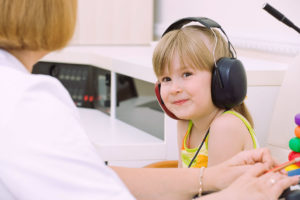(Please note: Speech/language and feeding programs are available for NACD families only. Auditory programs are open to everyone. Click here to learn about how to become an NACD client.)
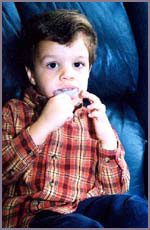 We know that effective communication skills are of critical importance during the development process and throughout our entire lives. Our ability to express our needs and thoughts and our ability to relate to others in the world around us are dependent upon our being able to communicate effectively.
We know that effective communication skills are of critical importance during the development process and throughout our entire lives. Our ability to express our needs and thoughts and our ability to relate to others in the world around us are dependent upon our being able to communicate effectively.
NACD staff, including a Certified Speech/Language Pathologist, take a global approach to speech and language skills. We look at all the components and address all relevant areas including:
- oral motor skills
- auditory tonal processing
- auditory sequential processing
- receptive language
- articulation
- communication competence
- cognition
Our evaluators will assess your child’s speech, language, and processing as part of the evaluation process. They will then include activities on your NACD program to address these areas. When more specialized or intensive remediation is required, they will recommend that you consult with Lori Riggs, our on-staff speech pathologist. Families at our Utah chapter can arrange for an in-person evaluation with Lori; others can consult via video and phone. Following the evaluation Lori will provide specific recommendations for addressing your child’s speech/feeding/auditory concerns. These will be added to your program and e-mailed to you so that you have access to video links and handouts. If your evaluator has recommended that your child have an assessment with Lori, contact us for instructions for making the speech video for him or her.
Many of our families are already involved with speech therapists when they come to NACD. Or some are considering adding outside services and wonder whether to participate in our program or to pursue working with a local therapist. With NACD’s speech program, we have the advantage of a team approach. Lori will work with your evaluator so that we are working together to address your child’s priorities in a consistent, cohesive way. Your speech program will follow the philosophy of the NACD approach, that is, address pertinent issues by providing specific activities with appropriate frequency, intensity, and duration. In addition, as with your overall NACD program, you will be implementing the activities daily. Daily input and practice will produce desired change more rapidly than one or two speech therapy sessions each week.
Speech
When we talk about “speech,” we are referring to the mechanical aspects of producing verbal communication—how we use our voice, how we use the muscles of our mouth, how we produce speech sounds and put them together in the correct sequence to produce words, and how fluent and smooth we are with all of the above.
Without even taking into account the language components, the ability to produce smooth, intelligible speech requires that we are able to use our muscles correctly (adequate oral motor skills), sequence these muscle movements for speech (good motor planning), and coordinate that with correct voice usage.
When one of these components necessary for speech breaks down (for example, compromised oral motor skills due to low muscle tone), speech production is affected. We can provide activities to address each of these areas as needed to improve speech production.
Language
Rather than the actual motor production of speech, language refers more to the quality, content, and form of the communication.
Vocabulary, grammar, social interaction, and vocal inflection are all components of language.
Whether a child is in the babbling stage of language development or is an older child with difficulty interacting in social settings, specific input and activities can help to develop appropriate language skills.
Auditory Processing
Auditory processing can loosely be described as how the brain interprets and uses auditory input. Whether an individual has intact hearing or has hearing loss, auditory processing skills must be considered when assessing:
- speech
- language
- academic function
- attention
- listening skills
Difficulties with processing skills may manifest in a number of different ways:
- Being hyper- or hypo-sensitive to sound (for example, one child may cover his ears frequently, while another does not respond to sounds in his environment)
- Being unable to filter out background sounds
- Being easily distracted by sounds
- Constantly overwhelmed in noisy environments
- Difficulties with speech and language
- Poor vocal usage—always too loud or too soft
- Poor vocal inflection—such as a monotone voice or sing-song voice
- Poor reading skills
- Poor attention
Although other factors may also be at work, processing plays a significant role in these difficulties.
While some professionals hold that difficulties with processing can only be compensated for, we firmly believe that they can be directly addressed and improved.
Click here to read additional discussion of auditory processing.
Feeding
When feeding skills are compromised due to behavioral issues or oral motor difficulties, we can provide specific activities to remediate these areas. (Problems requiring medical intervention are referred to the individual’s physician.)
Feeding issues to be addressed may include:
- Poor chewing
- Gagging on certain textures
- Refusal
- Unable to manage liquids
- Unable to drink from a cup
- Children on non-oral feedings who need to develop oral skills.
Remediating oral motor skills, modifying diet and textures, and managing behavior frequently develop feeding skills successfully.
Hearing
A child’s hearing ability plays a critical role in the development of auditory processing, speech, and language skills. We discuss issues related to ears and hearing at length with parents. We at NACD do not test for nor diagnose hearing loss. But we will be happy to guide you in determining who may be the best professional to help you assess and treat, if necessary, your child’s hearing issues, such as an audiologist or ENT.
Speech & Language Articles

Sound Therapy in Quarantine: TSI – Targeted Sound Intervention

Tymps, Tymps, Tymps
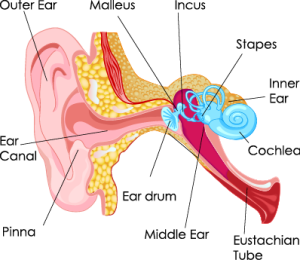
Middle Ear Fluid
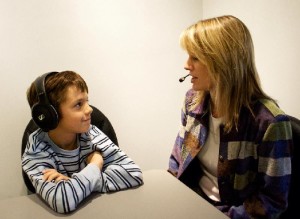
“Can You Hear Me Now?” – FM Systems
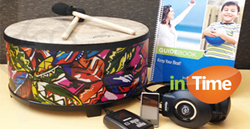
NACD’s Preliminary Trial of the inTime Program

So You Developed a Skill (So What?)

Addressing Auditory Processing NACD’s Way
